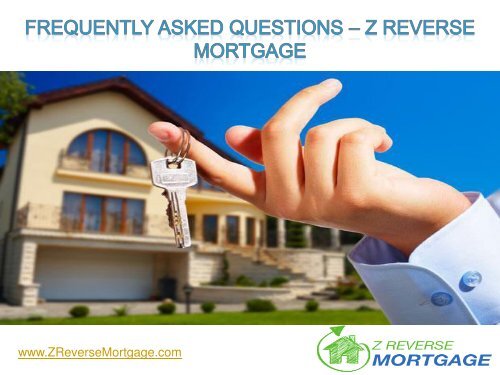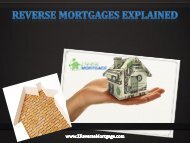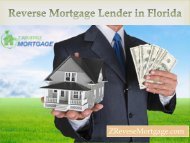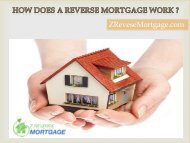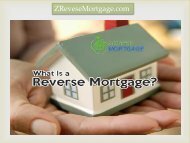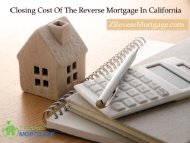Frequently Asked Questions - Z Reverse Mortgage
A reverse mortgage is a loan that allows you to convert a portion of your home equity into income. When you enter into a reverse mortgage, you can choose to receive a single large payment, smaller payments every month, or a line of credit. Under a reverse mortgage, you will not have to make any loan payments until the home is sold, the borrower dies, or the home is no longer used as a primary residence.
A reverse mortgage is a loan that allows you to convert a portion of your home equity into income. When you enter into a reverse mortgage, you can choose to receive a single large payment, smaller payments every month, or a line of credit. Under a reverse mortgage, you will not have to make any loan payments until the home is sold, the borrower dies, or the home is no longer used as a primary residence.
You also want an ePaper? Increase the reach of your titles
YUMPU automatically turns print PDFs into web optimized ePapers that Google loves.
www.Z<strong>Reverse</strong><strong>Mortgage</strong>.com
What is a <strong>Reverse</strong> <strong>Mortgage</strong>?<br />
A reverse mortgage is a loan that allows you to convert a portion of your home<br />
equity into income. When you enter into a reverse mortgage, you can choose to<br />
receive a single large payment, smaller payments every month, or a line of credit.<br />
Under a reverse mortgage, you will not have to make any loan payments until the<br />
home is sold, the borrower dies, or the home is no longer used as a primary<br />
residence.
What does HECM Stand for?<br />
HECM stands for Home Equity Conversion<br />
<strong>Mortgage</strong>. An HECM reverse mortgage is a<br />
loan regulated and insured by the Federal<br />
Housing Authority.<br />
Because it is government insured, your home<br />
will be protected even if your lender goes out<br />
of business or if your loan exceeds the value<br />
of your home.<br />
loan will not have to be repaid until the house is sold, the owner dies, or the owner<br />
no longer uses the house as his primary residence.
How do I qualify for a reverse mortgage?<br />
To qualify for an HECM reverse mortgage:<br />
You (and your spouse) must be at least 62<br />
years of age.<br />
You must own your home outright or<br />
have substantial equity in your home.<br />
Your home must be your primary<br />
residence.<br />
Eligible properties include 1-4 unit<br />
homes as well as manufactured homes<br />
and condominiums that meet FHA<br />
requirements.<br />
The home is used to secure the mortgage, so no credit check is necessary.
How much cash will I get and how will I be<br />
paid?<br />
In order to determine how much cash you will<br />
receive, you will need to contact a lender and<br />
inquire about their reverse mortgage<br />
programs. The amount of the reverse<br />
mortgage will depend:<br />
‣ On the youngest borrower’s age<br />
‣ The current interest rate<br />
‣ The lesser of the appraised value or the HECM FHA mortgage limit of<br />
$625,500<br />
‣ Initial <strong>Mortgage</strong> Insurance Premium<br />
You can choose to be paid by a single large payment, smaller payments every<br />
month, a line of credit, or a combination of those options.
Can I lose my home?<br />
HECM reverse mortgages are federally insured, so that even if your loan<br />
becomes greater than your property value, you will not lose your home. As long<br />
as you continue to pay property taxes and hazard insurance, you will be able to<br />
live in your home.<br />
What happens to my debt?<br />
As long as you are living in the home, you will not be required to make any<br />
payments on the loan. Once the home is no longer your primary residence, you<br />
have sold the home, or you have died, the loan will become due. Once the loan is<br />
due you or your heirs will have to either pay the loan or sell the property.<br />
Proceeds of the sale will go towards the balance of the loan, but all remaining<br />
equity will go to you or your heirs.
Will the home be passed on to my heirs?<br />
What happens with a reverse mortgage after<br />
death?<br />
After death the loan will become due. Your heirs<br />
will have to sell the home and use the proceeds to<br />
pay the balance of the loan. If there is remaining<br />
equity, this will go to your heirs once the loan is<br />
paid. Under no circumstances will any additional<br />
debt be passed onto heirs. If your heirs wish to<br />
keep the property, they will have to pay the<br />
amount of the loan.<br />
If your heirs wish to keep the home, they will have to pay the amount of the loan.<br />
Otherwise, they will have to sell the home and offer the proceeds to the lender. If<br />
there is any remaining equity, the heirs will receive it once the balance of the loan<br />
has been paid.
What is the difference between a reverse<br />
mortgage and a home equity loan?<br />
When taking out a home equity loan or taking<br />
out a second mortgage, you are expected to<br />
make monthly loan payments on the principal<br />
as well as the interest. With a reverse<br />
mortgage, you will receive payments every<br />
month and will not have to make any<br />
payments on the principal or interest until you<br />
sell the home or no longer live there.
Why should I get a reverse mortgage?<br />
A reverse mortgage is a great option if you are looking for additional monthly<br />
income. An HECM reverse mortgage is government-insured, so you are protected<br />
against losing your home and you will be able to live there as long as you<br />
continue to pay property taxes and hazard insurance.<br />
By finding the right loan program and the right lender, you will be able to structure<br />
your reverse mortgage to meet your specific financial needs.


